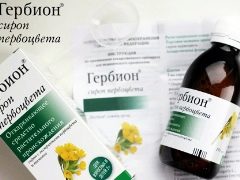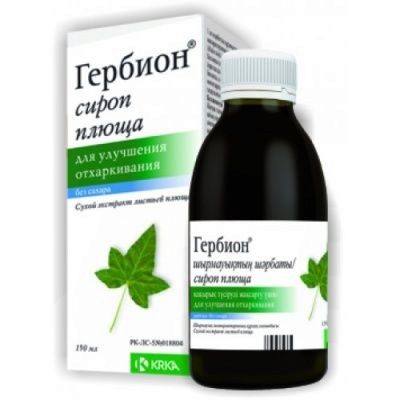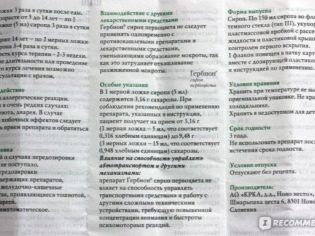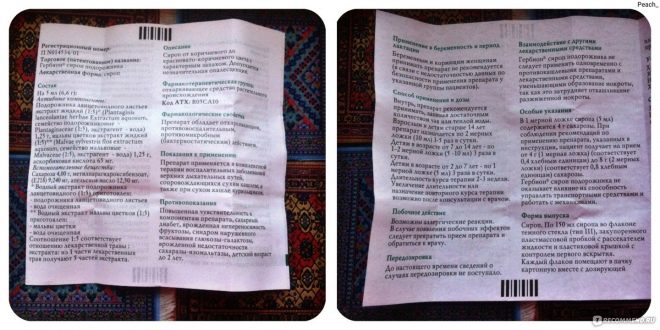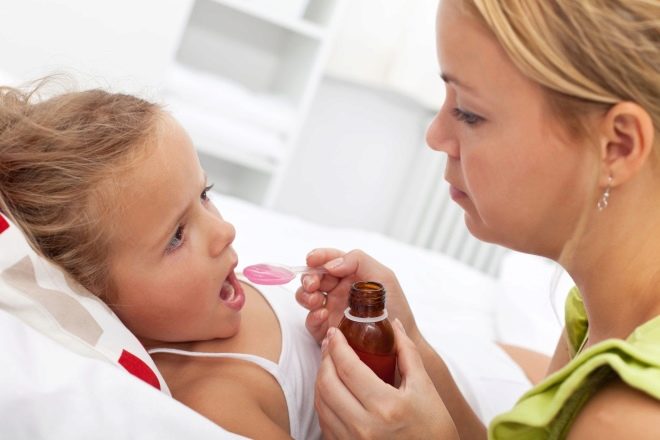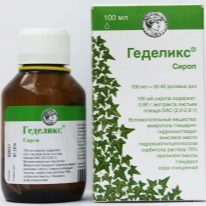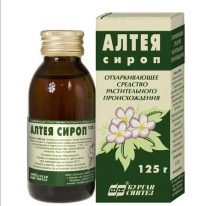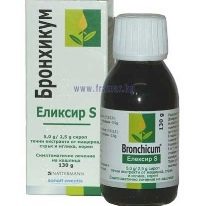The use of syrup "Gerbion" in the treatment of cough in children
For the treatment of cough in a child, herbal preparations are often prescribed, for example, Herbion. Such remedies affect sputum and help turn a dry cough into a productive one, which speeds recovery. But, before giving the medicine to a child, it is worthwhile to know about its effect on the children's organism, the permitted dosages and the possible harm.
Release form
Preparations "Herbion"Which help from dry and wet cough, are produced in Slovenia by KRKA. These are three different syrups with a similar effect, but with a different composition. They are all sold in bottles made of dark glass. Inside one bottle is 150 ml of brown syrup-like liquid, which has a peculiar odor caused by the main component of the medicine. A plastic spoon with graduations of 1.25 ml, 2.5 ml and 5 ml is attached to the bottle.
Composition
Depending on the active ingredients, several Herbion cough remedies are distinguished.
- "Primrose syrup". 5 ml of this syrup contains slightly more than 1 gram of liquid extract from the roots of spring primrose, supplemented with another liquid extract in the amount of a little more than 2 grams - from thyme herb. Auxiliary components of the drug are sucrose and levomenthol. In addition, this syrup contains methyl parahydroxybenzoate.
- "Plantain Syrup". The effect of this drug is also provided by two liquid herbal extracts, presented in 5 ml of the drug at 1.25 grams. One of them is obtained from the leaves of the plantain, the second - from the flowers of mallow. The third active ingredient of such a syrup is ascorbic acid, contained in 5 ml of a solution of 65 mg. Additionally, the drug, like primrose-based syrup, includes methyl parahydroxybenzoate and sucrose, but levomenthol in “Plantain Syrup” is replaced by orange oil.
- "Ivy syrup". As the name implies, the main component of such a “Gerbion” is represented by an extract from ivy leaves. Unlike other syrups, this extract is not liquid, but dry. It is presented in 1 ml of the medicine with a dosage of 7 mg. It is supplemented with glycerol, liquid sorbitol, aromatic balsam and purified water. In addition, the medicament also contains citric acid and sodium benzoate, and there is a small amount of ethanol in the balm (0.01 mg per milliliter of the drug).
Operating principle
Plant extracts contained in any of the “Herbion” syrups have expectorant effects, that is, they are capable of influencing the expectoration of sputum from the respiratory tract during their diseases. Such extracts from medicinal plants reduce the viscosity of the bronchial secretion, with the result that it is easier to separate from the bronchial mucosa (this effect is called mucolytic). In addition, the Herbion Ivy syrup has the ability to relax the spastic muscles of the bronchi, and the plantain and primrose syrups additionally have antimicrobial effects.
Indications
The reason to appoint any of the syrups "Herbion" is a cough for various diseases of the respiratory system. Such drugs are recommended for very thick sputum, which the child coughs with great difficulty.They are used for bronchitis, tracheitis and other diseases.
From what age is prescribed?
The restriction for the use of any of the syrups under the brand "Herbion" is the age of 2 years. If the baby is not yet two years old, then when coughing, he is recommended to give other expectorant drugs approved for young patients.
Contraindications
Treatment with cough medicine "Herbion" is prohibited:
- if the child has hypersensitivity to the main or auxiliary component of the selected syrup;
- if a small patient has hereditary pathologies in which the sugar metabolism is disturbed;
- if the baby is diagnosed with diabetes.
Side effects
Because of the plant base, any of the “Herbion” syrups is capable of provoking an allergic reaction (rash, itching), therefore, when used for the first time, monitoring the tolerance of the drug is recommended. In some children, taking the Herbion syrup causes nausea or vomiting. As there is sorbitol in the composition of ivy-based medication, its use may lead to the liquefaction of stool.
Instructions for use
"Herbion" with any herbal extract should be given to the child after meals, so that the sweet medicine does not affect the appetite. Since the active ingredients settle to the bottom during storage, syrups should be shaken before each use. Usually the drug is taken undiluted from a measuring spoon, which is sold with a bottle of syrup. Next, the child should give the medicine to drink with warm water in large quantities. This will further enhance the expectorant effect of the drug.
Single doses depend on the active substance and the age of the small patient. For example, the dosages of Primrose Syrup for children of different ages are as follows:
- children 2-5 years old give the drug in half a spoon, that is, 2.5 ml;
- a child of 5-14 years old should be given a spoonful (5 ml each);
- adolescents over 14 years of age at one time need 10 ml of syrup, which corresponds to two scoops.
"Plantain syrup" is given to a child in such a single dose:
- in 2-7 years - 5 ml (full measuring spoon);
- in 7-14 years - from 5 to 10 ml, that is, 1-2 dosing spoons;
- over 14 years old - 10 ml each (two spoons at once).
Treatment with Ivy Syrup provides for such single dosages:
- at the age of 2-5 years - 2.5 ml (half of the dosing spoon);
- if the child is 6-12 years old, full spoon (5 ml of medication);
- a patient over twelve years old - 1-1.5 dosing spoons (from 5 to 7.5 ml of the preparation).
The frequency of receiving syrup on the basis of ivy extract - twice a day, other "Herbion" syrups - three times a day. The duration of use of such drugs usually does not exceed two to three weeks.
However, treatment with syrup containing an extract of ivy is limited to one week, and a longer reception is possible only after consulting a doctor.
Overdose
If a child accidentally drinks more syrup than recommended according to his age, diarrhea, vomiting, or severe nausea may occur. In such a situation, you must cancel the drug and seek medical help.
Interaction with other drugs
You should not give the child any of the Herbion syrups along with any antitussive drugs. With this combination of drugs, sputum will be worse excreted from the respiratory tract, which will adversely affect the patient's condition.
Terms of sale
To buy any of the drugs "Gerbion" for coughing a prescription is not required. The cost of the medicine depends on the main components - you need to pay from 230 to 280 rubles for a bottle of psyllium, the average price of medication based on primrose is 250-300 rubles, and one bottle of Gerbion Ivy costs 340-360 rubles.
Storage
Keep a bottle of syrup at home should be at room temperature, and storage in the refrigerator is not recommended. Shelf life of drugs based on ivy - 2 years, other syrups - 3 years. If it has expired, it is prohibited to give medicine to children.
In addition, after opening the bottle, any of the Gerbion syrups can be used for no longer than three months.
Reviews
On the use of vegetable syrup cough "Herbion" in children there are mostly positive reviews. They note the good portability and high efficiency of such funds. According to moms, it is easy to give medicine to a child, and the healing effect is manifested rather quickly. The disadvantages of the Gerbion syrups include the presence of sugar or ethanol in the composition, the relative high cost and impossibility of use at an early age.
Analogs
If for some reason the use of the "Herbion" does not work, The doctor will advise another herbal remedy with a similar effect on the respiratory tract:
- «Gedelix»;
- «Prospan»;
- "Doctor Theiss";
- «Althea syrup»;
- «Bronchipret»;
- «Bronhikum»;
- Tussamag;
- «Pectusin»;
- «Linkus».
The therapeutic effects of such syrups, solutions or drops are due to extracts that are obtained from ivy, althea, plantain, thyme and other plants. Some of them are allowed to give even to infants, but only after consulting with the doctor. In addition, with a strong cough, the pediatrician may also prescribe drugs that have a non-vegetable base, for example, Bromhexine, acetylcysteine, or ambroxol.
However, to use these funds independently, if they are not prescribed by a doctor, should not be given to children.
Read more about the Herbion syrup and its analogue in the next video.
